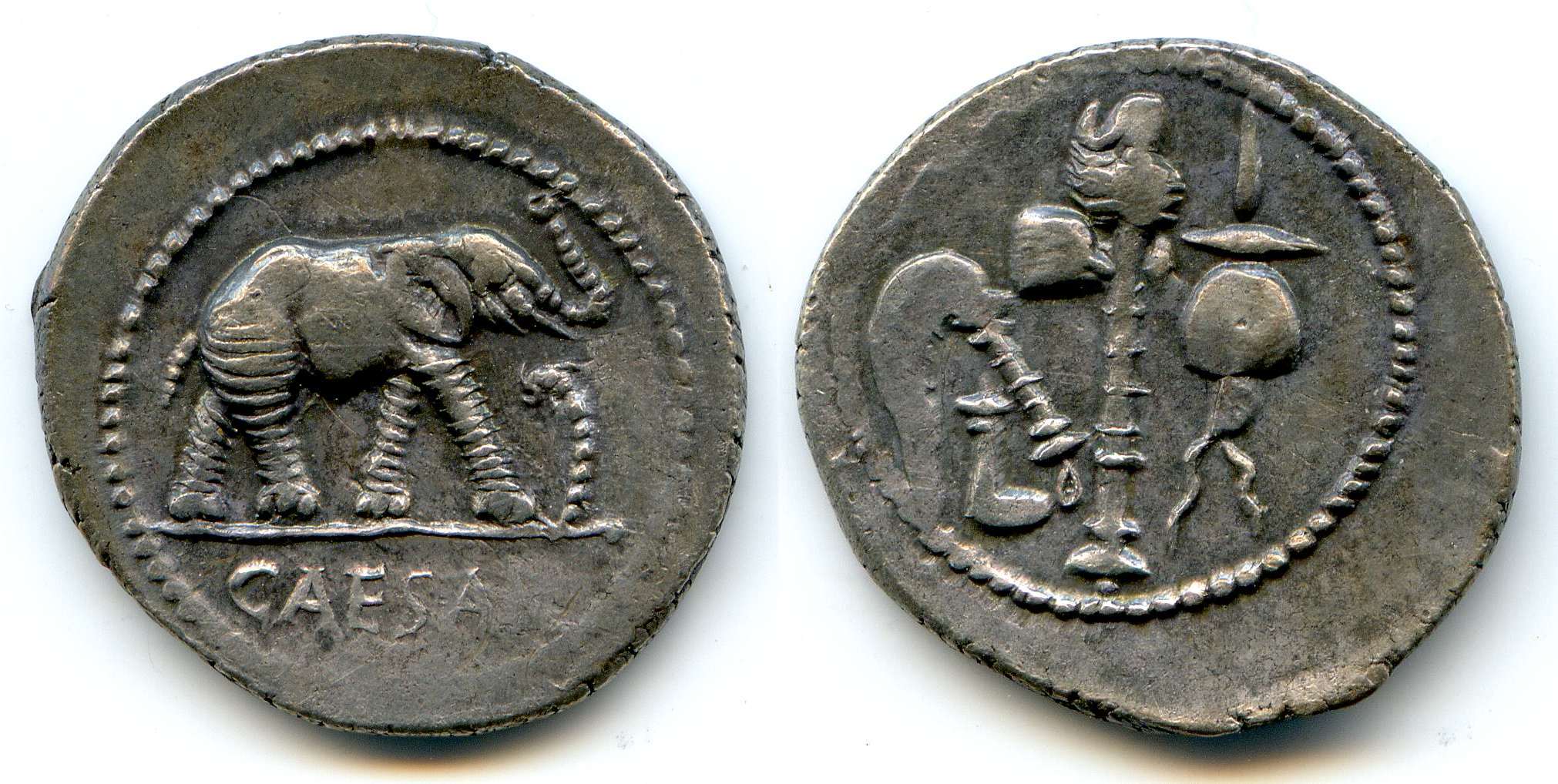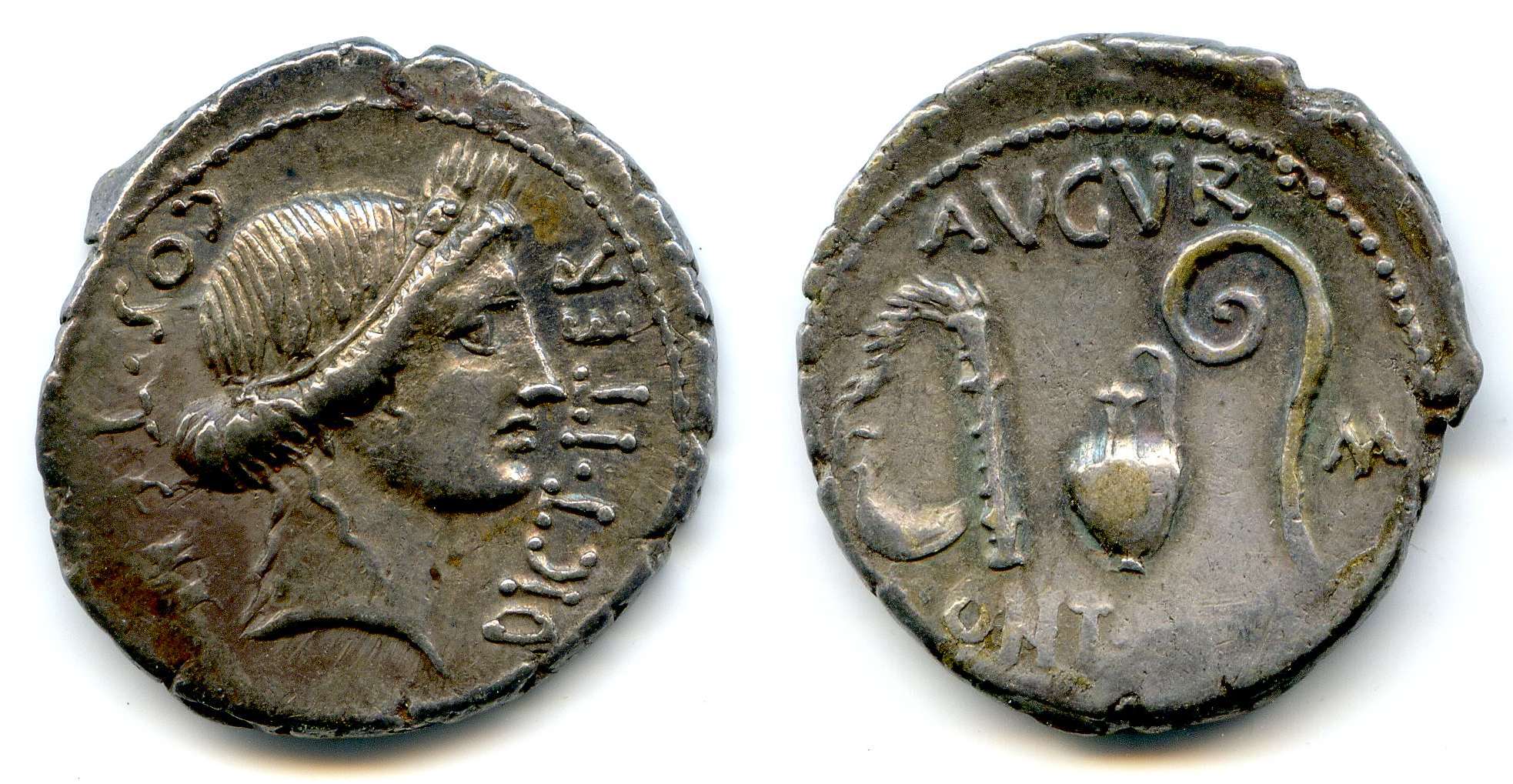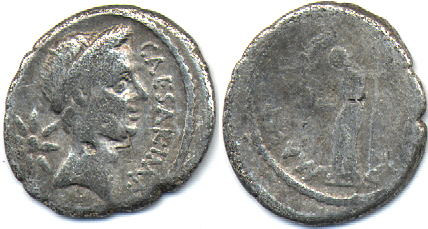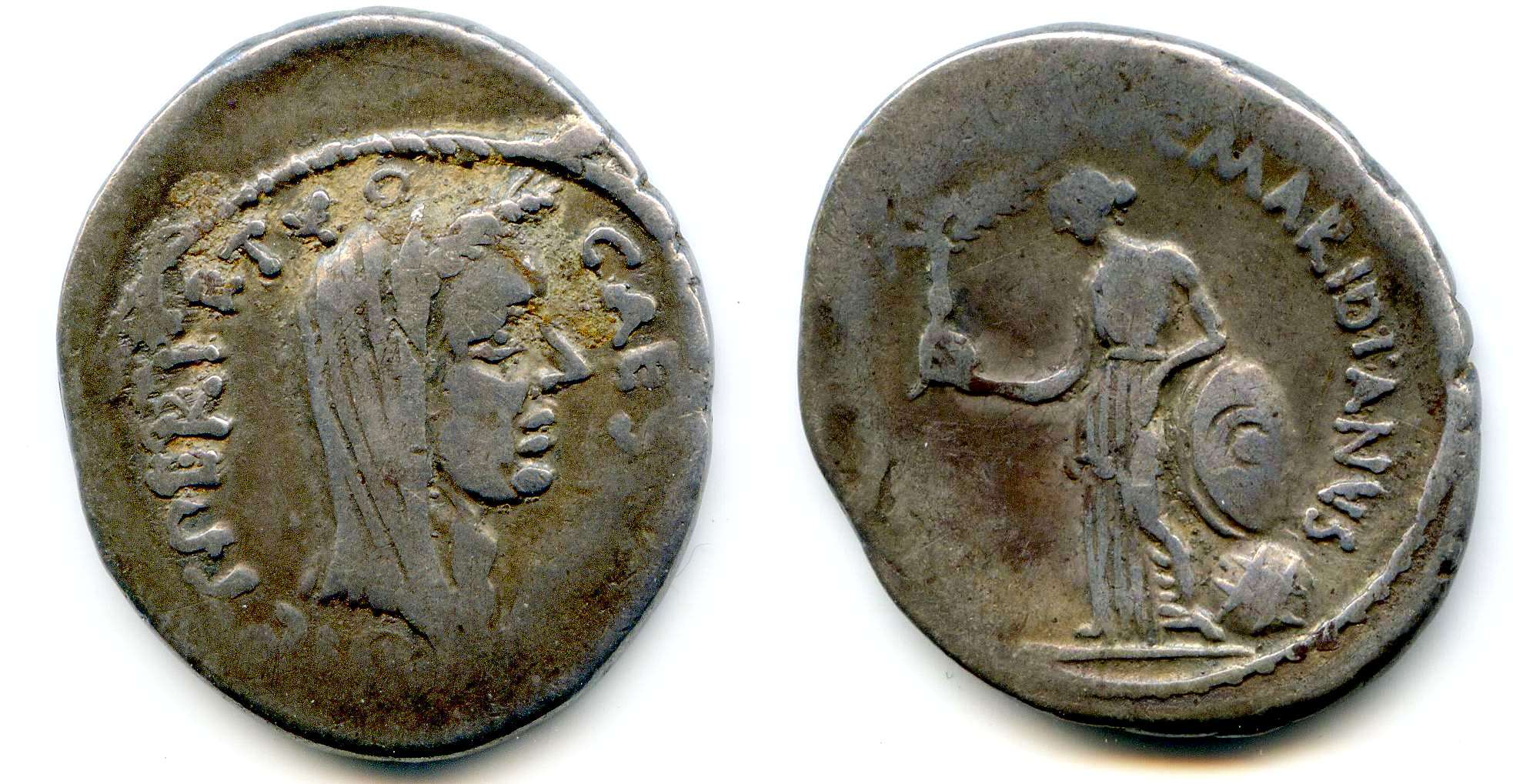Julius Caesar, 100-44 B.C.

Silver Denarius, 19.5 mm, c.49 BC
O: Elephant trampling on serpent. CAESAR below.
R: Simpulum, sprinkler, ax and priestly hat.
The obverse has been variously interpreted, but likely refers to Caesar's
recent military victories in Gaul. The reverse, displaying priestly
implements, refers to Caesar's office of Pontifex Maximus (chief priest).

Silver Denarius, 19 mm, 46 BC
O: Head of Ceres. COS TERT DICT ITER.
R: Simpulum, sprinkler, jug and lituus (priestly implements). AVGVR
PONT MAX.
The obverse shows the goddess of corn and is symbolic of Africa's corn
producing wealth. In 46 BC Caesar was victorious against Scipio in
Africa. The "M" to the right in the reverse indicates that this
coin was part of Caesar's gift to his successful legions.

Silver Denarius, 18 mm, Jan-Feb 44 BC.
O: Head of Julius Caesar, CAESAR IMP, star behind.
R: Venus holding Victory. P. SEPVLLIVS MACER (name of the moneyer)
In January of 44 BC, Caesar placed his portrait on the coinage, the first time
the portrait of a living person appeared on coins struck in Rome.
The action was shocking to his contemporaries, and led considerable fuel to the
speculation that he sought to overthrow the Republic and be named king.

Silver Denarius, 20 x 18 mm, Feb-March 44 BC.
O: Veiled head of Julius Caesar, DICT IN PERPETVO CAESAR.
R: Venus holding Victory. C. MARIDANVS (name of the moneyer)
Struck slightly later than the coin above, the legend describes Caesar as
"Dictator in Perpetuity", or dictator for life. Julius Caesar was
named dictator for life in February of 44 BC. Under Roman law, dictators had
been named in times of emergency, but were assigned dictator only for a set
period of time. Naming someone dictator for life was completely unprecedented.
Gaius Julius Caesar rose from relative obscurity to supreme power in the late Roman republic. A brilliant general and formidable politician, he defeated all rivals to become dictator of Rome.
Caesar achieved distinction relatively late in life. His early career is noteworthy for opposition of the aristocratic Senatorial conservatives in favor of the more "common" man. For years a protégé of the powerful and immensely wealthy Crassus, Caesar was able to capitalize on the rivalry of Crassus with the equally powerful Pompey. In 60 BC, the three men formed the First Triumvirate, a pact which effectively divided rule among them.
In 58 BC, Caesar went off to Gaul (France ) to command military operations. In Gaul, Caesar's forces were almost always far outnumbered, and fought in foreign territory far behind enemy lines with great bravery, daring, and tactical skill. When his forces appeared to be losing ground, Caesar had a habit of rushing to the front lines, putting himself at great personal risk. Significantly, he was a charismatic leader who won the undying loyalty of his soldiers. Then and now, Caesar's Gallic campaign drew comparisons to Alexander the Great.
In the meantime, Crassus had died during a poorly-managed, ill-fated invasion of Parthia (Persia), leaving Pompey alone in Rome. Pompey and the Roman Senate grew wary of Caesar's tremendous popularity and miltary power, and ordered him to disband his army and return to Rome. Caesar realized he would be in great danger if he agreed. Instead, in 49 BC, he marched his army on Rome, which he took with ease, but not before Pompey fled to Greece.
Caesar defeated Pompey in Greece, and chased him to Egypt. While in the region, the 52 year-old Caesar met and was captivated by the 21 year-old Cleopatra. Cleopatra was, at the time, involved in a power struggle with her brother, Ptolemy XIII. Caesar intervened in her behalf, fighting the Alexandrian War of 47 BC during which Ptolemy XIII perished and Cleopatra's throne was secured. Soon after, Cleopatra gave birth to Caesar's child.
Returning to Rome, Caesar's power was unopposed. Not surprisingly, he was showered with great honors and awards, but Caesar desired more. Like his hero, Alexander the Great, Caesar wanted to conquer Asia. But it had been prophesied that Asia could only be subdued by a king, and Casear was merely a dictator with supreme power. In 44 BC, as Caesar was preparing to request the Senate for the use of the title "King" while outside of Italy, he has murdered by a large group of senatorial conspirators.
Casesar's murder has been portrayed as a noble act, an attempt to fight tyranny, avoid a monarchy and restore rule by the Senate. Those sentiments may have played a part with some of the conspirators (in particular Brutus.) However, it is noted that Caesar was consistently a threat to the Roman aristocratic elite. Caesar was in the process of greatly enlarging Senatorial membership, treatening to unsettle the social order that had served the largely elitist conspirators.
Following the assassination, Caesar's heirs, Antony and Octavian, were able secure Rome and defeat the consiprators. Eventually Octavian became the first Roman Emperor (Augustus), bringing the Roman Republic to an end.